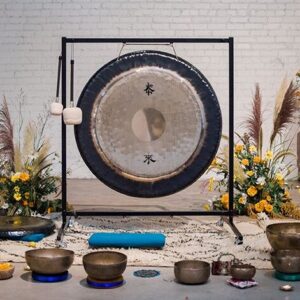Description
Please reserve your spot on the BOOKING page!
The term “nidra” comes from Sanskrit and literally means “sleep“. In the practice of Yoga Nidra, however, it takes on a different meaning from the commonly understood one: in this case sleep refers to a conscious and somehow active mental condition, different from the state of total unconsciousness that we assume during the night.
Yoga Nidra, therefore, means sleep yoga, a technique used by yogis to reach a state of deep meditation and relaxation that has its roots in an ancient tantric practice called nyasa (literally “put or bring the mind on one point”).
Swami Satyananda Saraswati is the one who studied and then spread all over the world the Yoga Nidra. Satyananda developed the practice into a powerful tool of meditation and “dynamic sleep” in which the body seems to sleep, but the mind is active. The Indian master, in fact, noticed that the waking state that precedes the actual sleep makes the mind more receptive and that, through a guided relaxation, it is possible to reach this state in a conscious way.
The practice of Yoga Nidra is guided by the voice of those who conduct relaxation – you can also follow a recording or a video online – and you just need to listen while remaining on the back and lying down. Generally, the duration of a Yoga Nidra session can vary from a minimum of 20 minutes to a maximum of 1 hour.
In Ravi Marga we offer a unique Yoga Nidra session which is characterized, once again, by the musical instruments that we use during the session, like the Symphonic gong, the Handpan, Koshi, Tibetan singing bowls, quartz bowls and many others, allowing the practitioner to let go from tension in a deeper way.
THE BENEFITS
During this relaxing practice, one is apparently asleep, while at the level of consciousness one gradually reaches a deeper state of consciousness. The practitioner who starts a session of Yoga Nidra perceives, from the outset, a sense of deep relaxation, but the beneficial effects on the entire organism are numerous.
First of all, it favors the dissolution of every muscular tension that often represents a direct reflection of worries and stress on a mental level: Yoga Nidra, in fact, has the ability to act positively on the muscles as well as on the nervous and endocrine system. On average, an hour of practice is able to regenerate as 4 or 5 hours of sleep. One of the main benefits of Yoga Nidra, in fact, is its being a natural remedy for those who have difficulty sleeping and that, because of this difficulty, also accuses other illnesses such as headaches or sense of exhaustion. As a result, it can happen that our nervous system is tense and that the muscles are contracted, perceiving a feeling of apprehension and stress.
To restore balance, Yoga Nidra takes advantage of a state of conscious relaxation in which you focus on every part of the body in a process during which the mind acquires a state of calm until the brain enters the so-called alpha state. This is the phase immediately following the wake in which the mind is relaxed, but still alert: alpha waves, in fact, are typical of meditative and yogic practices.
Given its beneficial effects for those who have difficulty falling asleep, the advice is to practice Yoga Nidra to sleep in the evening time, after eating a light meal, although there are no contraindications neither for the morning than for the afternoon.
Please reserve your spot on the BOOKING page!







